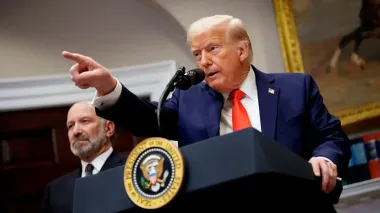Large investors are leaving the US market due to Trump's actions

Big investors flee the US due to Trump's trade wars
The US president's erratic trade policies in recent months have shaken global markets, led to a sharp weakening of the dollar and led to Wall Street stocks lagging behind their European peers this year.
Trump's tax bill, which is projected to add $2.4 trillion to the US national debt over the next decade, has also increased pressure on US Treasury bonds.
"People need to rethink their dependence on the United States," said Seth Bernstein, CEO of AllianceBernstein, which manages $780 billion in assets.
The deficit has been a problem for a long time, and it's only getting worse. You can't keep borrowing at this rate forever. And when you add to that the unpredictability of trade policy, you have to wonder: Are you holding too much in one market?
As institutional investors review their exposure to the US, Canada's second-largest pension fund, Caisse de dépôt et placement du Québec, recently announced that it will reduce its US exposure (which currently accounts for 40% of its portfolio) and instead increase investments in the UK, France and Germany.
Although US stocks have recovered from the fall caused by the imposition of tariffs on April 2, the S&P 500 index has risen less than 2% since the beginning of the year, while the European Stoxx Europe 600 has risen by 9%.
The dollar is nearing a three-year low, down 9% this year, even as Trump partially rolled back many of the tariffs he initially announced.
Investors acknowledge that the dominance of the US economy and the depth of its financial markets still make the country attractive to global capital. But there are growing doubts about the sustainability of that dominance after more than 15 years of steady capital inflows and high returns that saw the US account for about two-thirds of global equity market capitalization at the start of the year.
"We are already seeing the first signs that investors are starting to move away from the US," said Richard Oldfield, CEO of the British investment company Schroders.
European markets have been one of the beneficiaries of this turnaround: Germany's massive spending on defense and infrastructure (worth €1 trillion) is expected to boost growth.
"We're pretty bullish on Europe," says Tom Nides, vice president at Blackstone. "Governments are more stable here. Moving money to Europe is a smart move."
Some investors, however, doubt that the fragmented markets of Europe and Asia can become a full-fledged alternative to the United States.










